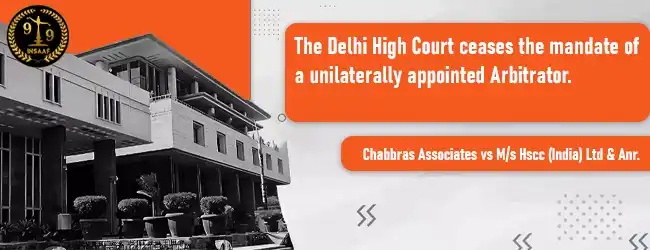2024-Mar-14

The Petitioner filed a petition under Section 11 of the Arbitration and Conciliation Act, 1996 seeking the appointment of a sole Arbitrator to adjudicate upon the disputes arising because of premature termination of the work order which was assigned to the petitioner by the Respondent No1.
The petitioner had approached this Court by way of an application seeking appointment of the arbitrator however the petitioner was directed to exhaust all the remedies available to them as per the dispute resolution mechanism mentioned in the work agreement. Thereafter the petitioner approached Respondent No.2 i.e., the appealing authority seeking the resolution of the disputes. The Appealing Authority responded to the Representation and the claims of the Petitioner were rejected.
The petitioner further also exhausted all the remedies provided in the agreement for dispute resolution and sought the appointment of a fair, neutral, and unbiased arbitrator as per clause 25 of General Conditions of Contract (GCC). The Respondent No.2 unilaterally appointed Shri Anant Kumar, Engineer in Chief (Retd.) CPWD as the Sole Arbitrator without the concurrence of the Petitioner.
It was the contention of the Ld. Counsel for the Petitioner that the appointment of an Arbitrator as per Clause 25 of the GCC was contrary to the settled principles of neutrality, independence, and impartiality and that if a sole arbitrator is to adjudicate upon the disputes between the parties then any interested party cannot have the exclusive right to appoint such sole arbitrator.
The High Court observed thus:
It is no longer res-integra that if a party has entered into an arbitration agreement which contains a clause that gives only one of the parties the exclusive right to appoint an arbitrator is bad in the eyes of the law and contrary to the legislative intent. It is a settled principle of law that this court has the power to appoint an arbitrator in case where the appointment has been made unilaterally by a party interested in the proceedings.
The Supreme Court ruled in Perkins Eastman Architect DPC and Anr. vs. HSCC (India) Ltd.: (2020) 20 SCC 760 that a party with an interest in the dispute cannot unilaterally name or appoint an arbitrator. There must be an independent arbitrator for the adjudication of disputes.
In my view the arbitration clause empowering unilateral appointment of a sole arbitrator stands vitiated in light of the law laid down by the apex court in Perkins (Supra). The contention of learned counsel for the respondent that since arbitrator has been appointed in terms of the contract, the only option available to the petitioner is to challenge the mandate of the arbitrator, is noted to be rejected. The unilateral appointment of an arbitrator in terms of Clause 25 of GCC is patently bad in law. The continuance of such would only amount to allowing the perpetuation of illegality. The Court cannot simply allow such illegality, merely because the petition has been filed under Section 11 of the Act and not under Section 14 and 15 of the Act, as raised by the respondent. Any unlawful act has to be put to an end immediately.
Chabbras Associates vs M/s Hscc (India) Ltd & Anr.
What can the Legal Experts do for you? Our team of lawyers is ready to help you in minutes with any legal question.
 Whatsapp
Whatsapp
 Toll Free :-
1800-212-9001
Toll Free :-
1800-212-9001